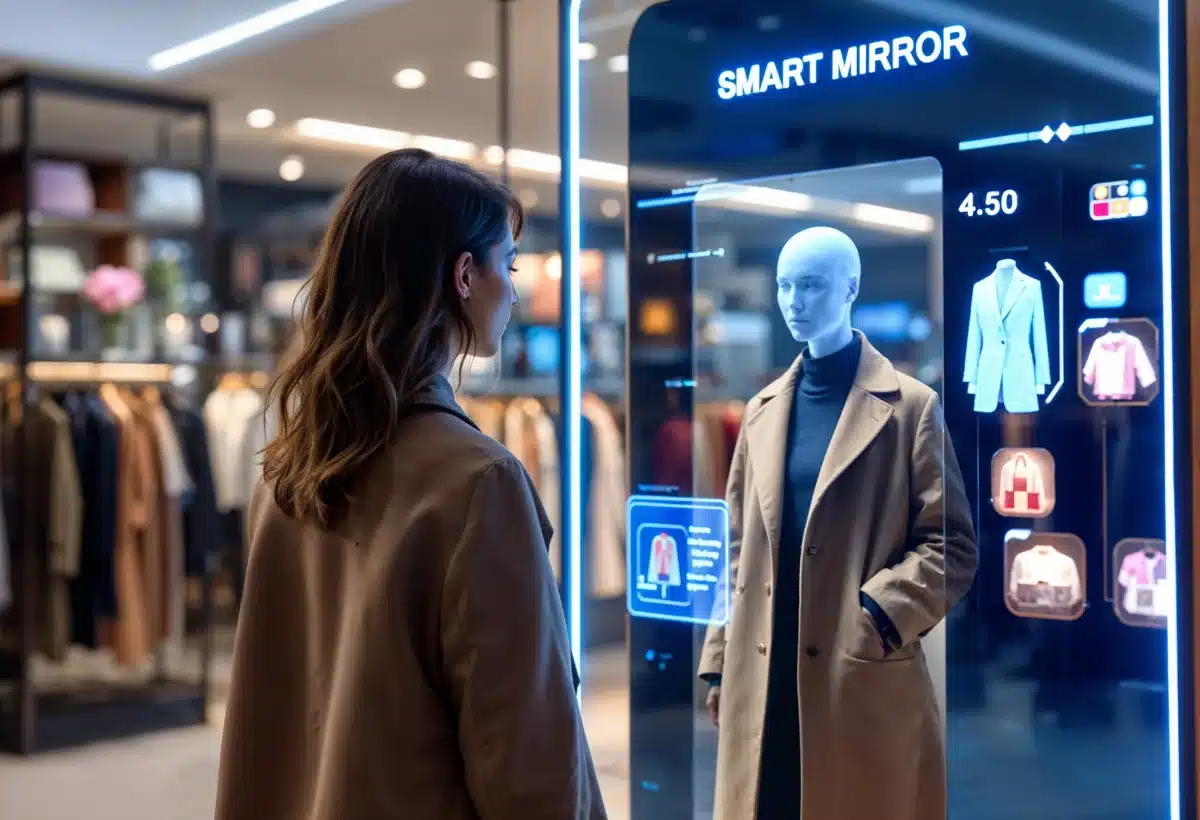In today’s digital marketplace, AI in retail personalization is no longer a luxury but a necessity for brands aiming to captivate the next generation of shoppers. By leveraging AI-powered tools, retailers deliver tailored product recommendations, dynamic pricing, and seamless customer journeys that drive engagement, loyalty, and revenue growth. Studies show that 80% of consumers are more likely to buy when offered personalized experiences, with hyper-personalization projected to generate trillions in retail revenue by 2025.
This article explores the evolution, latest trends, and advanced tactics of AI-driven retail personalization, highlighting how professionals can master these transformative technologies through specialized education programs.
Evolution of AI in Retail Personalization: From Basic Recommendations to Hyper-Personalized Journeys
Personalization in retail has matured from static segment-based marketing to dynamic, AI-powered experiences. Early e-commerce platforms relied on basic recommendation engines analyzing purchase history. Today, sophisticated AI models incorporate real-time behavior, contextual signals, and even visual data to tailor shopping experiences at an individual level.
Retail leaders like Amazon pioneered collaborative filtering and deep learning techniques to generate over 35% of their revenue from personalized recommendations. Fashion platforms such as Myntra use computer vision and machine learning to curate style bundles aligned with unique customer preferences, boosting repeat purchases and engagement. These advancements are part of a broader trend toward AI-driven loyalty programs and data insights, creating truly personalized shopping journeys that anticipate customer needs.
Latest Features, Tools, and Trends in AI-Driven Shopping
Personalized Recommendations and Dynamic Pricing
AI algorithms analyze purchase patterns, browsing behavior, and contextual factors like seasonality or location to deliver hyper-targeted product suggestions. Dynamic pricing engines adjust prices in real-time based on demand, competitor pricing, and customer profiles, optimizing both revenue and satisfaction. For instance, Shopify merchants leverage AI-powered upselling tools such as Rebuy and LimeSpot to increase average order value by up to 25% through personalized cross-sell recommendations.
These systems automate relevant add-on suggestions during checkout or post-purchase, enhancing the buyer’s journey without manual effort.
Predictive Analytics and Inventory Optimization
AI-driven demand forecasting models use historical sales, market trends, and unstructured data to optimize inventory and reduce stockouts. German grocery chain REWE improved product availability and cut waste for perishables through such AI applications. Similarly, Indian retailers combine hyper-local data with AI to enhance operational efficiency and planogram adherence.
Hyper-Personalization and Real-Time Customer Journeys
Hyper-personalization integrates AI and real-time analytics to craft context-aware shopping experiences. Research indicates hyper-personalized experiences can generate up to 40% more revenue than generic ones. Retailers increasingly deploy AI agents capable of recognizing customers by name, recalling past interactions, and proactively suggesting relevant products, creating seamless, tailored journeys that foster loyalty.
Generative AI and Agentic AI in Retail
The frontier of retail AI includes generative AI-powered assistants, such as NVIDIA’s AI Blueprints and Google’s generative AI tools. These enable the creation of autonomous AI agents that handle customer support, personalized marketing, and inventory queries. Agentic AI principles empower these systems with autonomy to plan, learn, and act, delivering next-level retail experiences that adapt continuously to customer needs.
Emerging Technologies: AR/VR and Immersive Personalization
Augmented and virtual reality technologies, integrated with AI, are becoming pivotal in delivering immersive personalized experiences like virtual try-ons and interactive showcases. The advent of 5G networks enhances these capabilities, enabling retailers to engage customers with rich, tailored digital interactions beyond traditional channels.
Advanced Tactics for Success with AI in Retail Personalization
- Integrate Multi-Modal Data: Combine purchase history, browsing patterns, demographic details, and visual inputs (e.g., customer selfies) to improve recommendation accuracy, as demonstrated by Glance AI’s personalized fashion avatars.
- Leverage Real-Time Analytics: Use AI systems that respond instantly to live data streams for dynamic pricing and personalized offers, boosting conversion rates.
- Adopt AI-Driven Loyalty Programs: Starbucks’ AI-powered loyalty program exemplifies how purchase patterns can trigger timely, personalized rewards that increase retention.
- Deploy Conversational AI: Utilize chatbots and voice assistants powered by generative AI to offer personalized shopping advice and streamline customer support.
- Ensure Explainability and Transparency: Incorporate explainable AI techniques to build customer trust and comply with evolving privacy regulations.
- Prioritize Data Privacy and Ethics: Establish robust data governance frameworks to protect customer information and maintain trust in AI personalization initiatives.
The Power of Content, Storytelling, and Community in AI-Driven Retail
Personalization extends beyond product recommendations to delivering tailored content that resonates emotionally with customers. AI analyzes interests to curate personalized emails, videos, and social media posts, fostering authentic engagement.
User-generated content and community-driven reviews enrich personalization by providing social proof and deepening customer relationships, transforming shoppers into brand advocates.
Measuring Success: Analytics and Insights for AI Personalization
Retailers should track key performance indicators including:
- Conversion rates from personalized recommendations
- Average order value uplift
- Customer retention and repeat purchase rates
- Inventory turnover and waste reduction
- Customer satisfaction scores and Net Promoter Scores
Advanced retail analytics platforms combine retail analytics with AI-driven insights and intuitive dashboards, enabling continuous optimization of personalization strategies based on real-time data.
Business Case Study: Myntra’s AI-Powered Style Suggestions
Brand Journey: Myntra aimed to enhance engagement and repeat purchases by refining fashion discovery.
Challenges: Traditional personalization failed to capture nuanced style preferences and visual cues like body shape or skin tone.
AI-Driven Solution: Myntra deployed a style suggestion engine leveraging computer vision and machine learning to recommend curated looks and bundles tailored to individual customers.
Results: The AI-powered initiative boosted user engagement, increased repeat purchase rates, and strengthened brand loyalty, illustrating the transformative power of AI in retail personalization.
Actionable Tips for Marketers Implementing AI in Retail Personalization
- Define clear business objectives and KPIs aligned with customer experience and revenue goals.
- Utilize cloud AI platforms offering pre-built personalization tools for rapid deployment.
- Maintain stringent data quality and privacy compliance to build customer trust.
- Blend AI-driven recommendations with human creativity in marketing campaigns.
- Continuously test and refine AI models using A/B testing and customer feedback loops.
- Invest in advanced AI education to build in-house expertise in agentic and generative AI technologies.
Why Choose Amquest’s Software Engineering, Agentic AI and Generative AI Course?
Amquest offers a comprehensive program designed for professionals eager to lead AI innovation in retail personalization:
- Robust Curriculum: Covers software engineering fundamentals alongside cutting-edge agentic and generative AI applications.
- Hands-On Projects: Real-world case studies enable mastery of AI personalization tools and techniques.
- Industry-Experienced Faculty: Mentors with deep expertise in AI deployment across retail and other sectors.
- Strong Industry Partnerships: Access to internships and placement opportunities with leading companies.
- Flexible Learning: Based in Mumbai with national online availability to accommodate diverse learners.
- Proven Career Outcomes: Graduates report enhanced roles and leadership opportunities in AI-driven organizations.
This unique blend equips professionals to architect autonomous AI systems that scale retail personalization effectively.
Conclusion: Embracing AI in Retail Personalization to Delight Next-Gen Shoppers
Harnessing AI in retail personalization is essential for brands committed to delivering hyper-personalized experiences that engage today’s savvy shoppers. By integrating AI-driven shopping tools, retail analytics, generative AI agents, and ethical data practices, retailers can boost loyalty, optimize operations, and drive growth.
For professionals aiming to lead this transformation, Amquest’s course provides the expertise and practical skills needed to build and deploy these powerful AI systems. Explore the course today and position yourself at the forefront of retail AI innovation.
FAQs
Q1: How does AI in retail personalization improve customer experience?
AI analyzes individual shopper data such as purchase history, browsing behavior, and preferences to deliver tailored product recommendations, offers, and content, making shopping more relevant and engaging.
Q2: What are the key AI-driven shopping tools used in e-commerce?
Popular tools include recommendation engines, dynamic pricing software, AI-powered upselling, chatbots, and generative AI retail assistants.
Q3: How is AI used in retail analytics?
AI processes large volumes of sales and customer data to forecast demand, optimize inventory, and measure personalization effectiveness, enabling data-driven decisions.
Q4: What role do AI-driven loyalty programs play in personalization?
They use purchase patterns and preferences to send personalized rewards and offers, increasing retention and lifetime customer value.
Q5: Can small and medium-sized retailers benefit from AI personalization?
Yes, many AI personalization tools are accessible without large data science teams, enabling retailers of all sizes to enhance customer engagement and sales.
Q6: Why is Amquest’s course ideal for learning AI in retail personalization?
It offers a unique blend of software engineering fundamentals with advanced agentic and generative AI modules, led by industry experts with internship placements, making it a superior choice for mastering AI personalization technologies.







